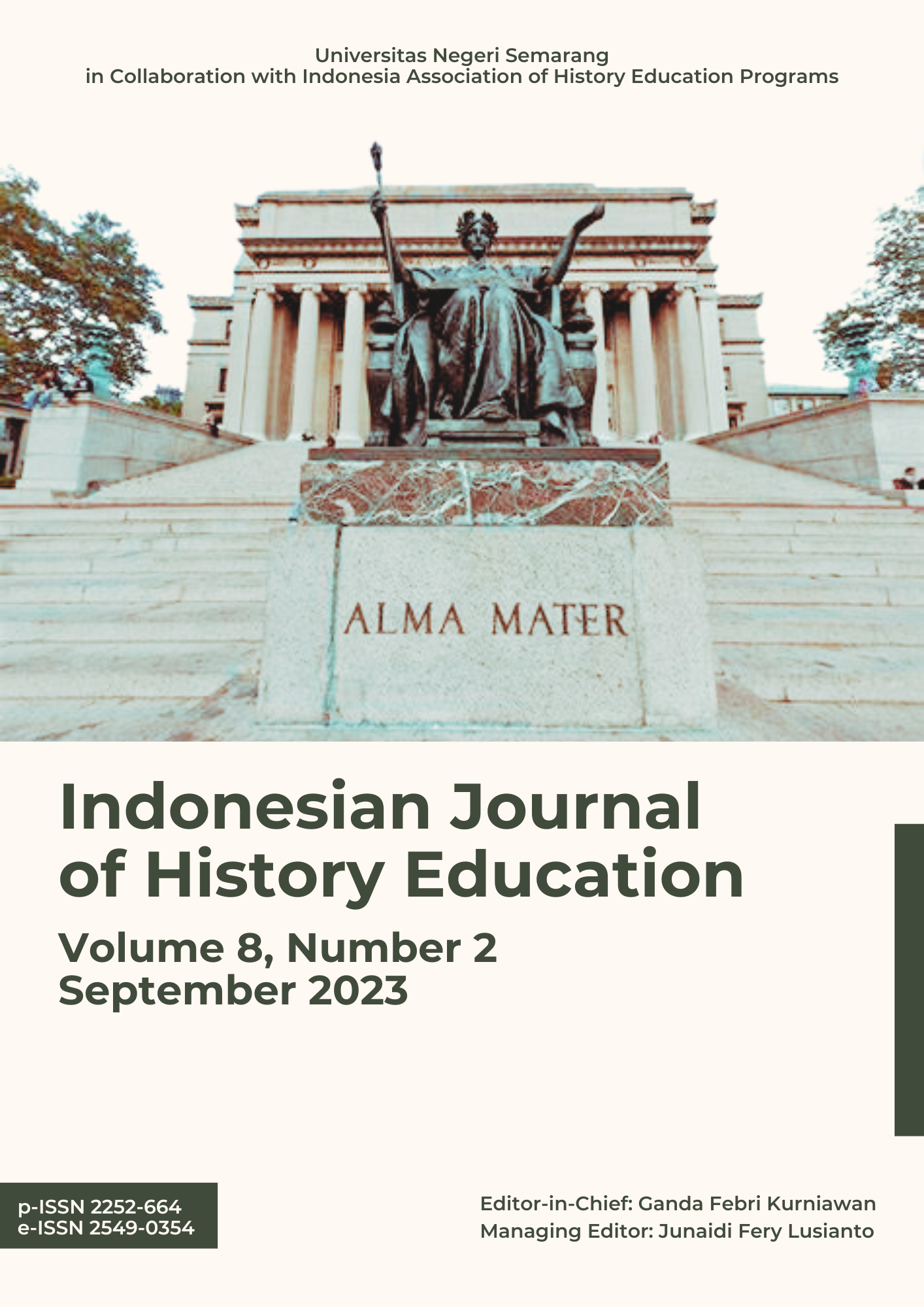Teacher Performance and Student Character in Islamic Schools: Case of History Learning in Spain's Pandemic Time
Abstract
This research aims to analyze teacher performance and student character in Islamic schools by highlighting the case of history learning in Spain during the Pandemic. This research uses descriptive qualitative methods. Research location in an Islamic-based school. The data sources in the research are informants, consisting of the deputy head of curriculum, history teacher, and student representatives from each class, learning activities, and documents. The results of this research show that planning for online history learning in Islamic-based schools is good, but teachers need to improve their competence and ability to adapt to technology; The role of history teachers in the process of cultivating character in pandemic conditions through distance learning is very limited. Interaction between teachers and students is very limited. Meanwhile, in distance learning, the assessment of the character of each student is seen from assignments, monitoring outside class hours, and communication with parents; Student responses to the role of history teachers in cultivating character through distance learning are different for each student. Student responses are influenced by students' interest in history subjects, as well as the methods and media used by teachers to attract students' attention.
References
Calvo, A. (2017). The state of development education in Spain: Initiatives, trends and challenges. International Journal of Development Education and Global Learning.
Chiner, E., & Cardona, M. C. (2013). Inclusive education in Spain: how do skills, resources, and supports affect regular education teachers’ perceptions of inclusion?. International journal of inclusive education, 17(5), 526-541.
Cresswell, J. W. (2014). Research Design: Qualitative, Quantitative, and Mixed Methods Approaches. Pearson.
Garreta-Bochaca, J., Macia-Bordalba, M., & Llevot-Calvet, N. (2020). Intercultural Education in Catalonia (Spain): Evolution of discourses and practices (2000-2016). Estudios sobre Educación, 38, 191-215.
Gómez, C. J., Solé, G., Miralles, P., & Sánchez, R. (2020). Analysis of cognitive skills in History textbook (Spain-England-Portugal). Frontiers in Psychology, 11, 521115.
Gómez-Carrasco, C. J., Miralles-Martinez, P., Fontal, O., & Ibañez-Etxeberria, A. (2020). Cultural Heritage and Methodological Approaches—An Analysis through Initial Training of History Teachers (Spain–England). Sustainability, 12(3), 933.
Hervas, G., Medina, J. L., & Sandín, M. P. (2020). Participants’ views of the use of video in lesson study in higher education in Spain: An exploratory multiple case study. Journal of Research on Technology in Education, 52(4), 461-473.
Huberman, A. (2014). Qualitative data analysis a methods sourcebook. Sage.
Jiménez, C., Arís, N., Magreñán Ruiz, Á. A., & Orcos, L. (2020). Digital escape room, using Genial. Ly and a breakout to learn algebra at secondary education level in Spain. Education Sciences, 10(10), 271.
Jo, E. S., & Gebru, T. (2020, January). Lessons from archives: Strategies for collecting sociocultural data in machine learning. In Proceedings of the 2020 conference on fairness, accountability, and transparency (pp. 306-316).
Malin, J. R., Brown, C., Ion, G., van Ackeren, I., Bremm, N., Luzmore, R., ... & Rind, G. M. (2020). World-wide barriers and enablers to achieving evidence-informed practice in education: what can be learnt from Spain, England, the United States, and Germany?. Humanities and Social Sciences Communications, 7(1).
Martínez-Valdivia, E., & Burgos-Garcia, A. (2020). Academic Causes of School Failure in Secondary Education in Spain: The Voice of the Protagonists. Social Sciences, 9(2), 11.
Navarro-Mateu, D., Franco-Ochoa, J., Valero-Moreno, S., & Prado-Gascó, V. (2020). Attitudes, sentiments, and concerns about inclusive education of teachers and teaching students in Spain. Frontiers in psychology, 11, 521.
Ofianto, O. (2018). Analysis of Instrument Test of Historical Thinking Skills in Senior High School History Learning with Quest Programs. Indonesian Journal of History Education, 6(2), 184-192.
Ortega-Sánchez, D. (2019). Teaching gender in the history classroom: An investigation into the initial training of primary education teachers. Education Sciences, 9(2), 114.
Pérez-Eransus, B., & Martínez-Virto, L. (2020). Social work education in Spain: Evaluation and challenges for a new generation of social workers. Social Work Education, 39(6), 750-764.
Ramos-Morcillo, A. J., Leal-Costa, C., Moral-García, J. E., & Ruzafa-Martínez, M. (2020). Experiences of nursing students during the abrupt change from face-to-face to e-learning education during the first month of confinement due to COVID-19 in Spain. International journal of environmental research and public health, 17(15), 5519.
Sala, F. J. A. (2020). Secondary education in spain amid the covid-19 crisis. International Journal of Sociology of Education, 53-78.
Sánchez Agusti, M., & Miguel Revilla, D. (2020). Citizenship education or civic education? A controversial issue in Spain. Journal of Social Science Education: JSSE, 19(1), 154-171.
Tejedor, S., Cervi, L., Tusa, F., & Parola, A. (2020). Education in times of pandemic: Reflections of students and teachers on virtual university education in Spain, Italy, and Ecuador. Revista Latina de Comunicación Social, (78), 1-21.
Ufie, A., Ritiauw, S. P., & Kubangun, N. A. (2020). Constructing the Local Wisdom Values of the Yel Lim Culture as a Historical Learning Source. Paramita: Historical Studies Journal, 30(1), 1-14.
Copyright (c) 2023 IJHE

This work is licensed under a Creative Commons Attribution 4.0 International License.
Copyright Notice
An author who publishes in the Jurnal Indonesian Journal of History Education agrees to the following terms:
- Author retains the copyright and grants the journal the right of first publication of the work simultaneously licensed under the Creative Commons Attribution-ShareAlike 4.0 License that allows others to share the work with an acknowledgement of the work's authorship and initial publication in this journal
- Author is able to enter into separate, additional contractual arrangements for the non-exclusive distribution of the journal's published version of the work (e.g., post it to an institutional repository or publish it in a book) with the acknowledgement of its initial publication in this journal.
- Author is permitted and encouraged to post his/her work online (e.g., in institutional repositories or on their website) prior to and during the submission process, as it can lead to productive exchanges, as well as earlier and greater citation of the published work (See The Effect of Open Access).
Read more about the Creative Commons Attribution-ShareAlike 4.0 Licence here: https://creativecommons.org/licenses/by-sa/4.0/.




